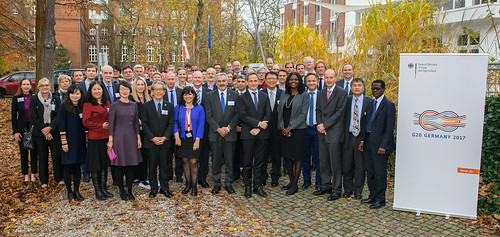
What should you have done with all of that leftover Thanksgiving turkey? Should you have frozen it, given it away, or composted it? Maybe these aren’t even the right questions. Should you have bought a smaller bird? What would you have done if you were in the country of Turkey? Or if you were in Japan?
You may never have thought that everyday questions like these could come up in international organizations, but they do. Food loss and waste (FLW) is a major global issue with far-reaching impacts on food security, resource efficiency and the environment. USDA’s Economic Research Service (ERS) estimates that in the United States, 31 percent of food available for human consumption at the retail and consumer levels goes uneaten. The U.S. approaches FLW in its own way, but it can benefit from teaching, learning from, and exploring collaborations with other countries.
FLW was one theme on the agenda for the recent Group of 20 (G20) Meeting of the Agricultural Chief Scientists (MACS) hosted by Germany. The G20 emerged as a forum for the governments and central bank governors of the 20 largest economies in the world. The G20 MACS was established in 2012 “to better coordinate agricultural research systems and to seek and apply common solutions strategies” in the fields of agriculture and nutrition across G20 countries. Since then, the G20 Agricultural Chief Scientists have gotten together annually to discuss important issues that can benefit from sharing information and approaches, and leveraging national agricultural research with efforts in other countries.
USDA represents the United States at the MACS. Dr. Chavonda Jacobs-Young, Acting USDA Chief Scientist, led the 2017 U.S. delegation during two days of pre-meetings followed by two days of formal presentations and discussions. In this role, she represented U.S. national agricultural research priorities and the breadth of USDA agricultural research.
In the case of FLW, USDA has robust research and outreach efforts. Through this international forum, the U.S. can share its efforts, learn from those in other countries, and leverage its research with complementary work of others. We learned that Turkey, for example, has focused its FLW efforts on reducing over-purchasing and creative reuses of stale bread, while Japan promotes waste reduction by requiring businesses to manage their own waste.
Based on U.S. research, it turns out the best solution to too much leftover turkey may not be in creative reuses at home, but in reducing FLW at the source – improving storage and distribution efficiencies earlier in the supply chain (see the U.S. Food Loss and Waste Reduction Hierarchy). Check out this ERS article for an in-depth overview of food loss. Happy holidays!

